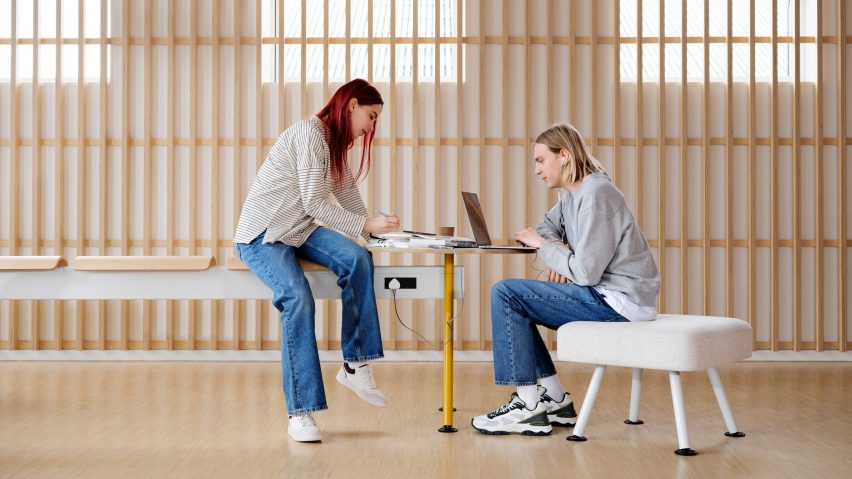Modern classrooms require new types of furniture, says industrial design studio Pearson Lloyd, which has developed a collection geared towards next-generation learning.
London-based Pearson Lloyd worked with British brand Senator to create CoLab, an experimental furniture range designed specifically with Gen Z in mind.
The designs are intended for classroom environments where the focus is on active and social learning, rather than the traditional model where a lecturer stands in front of rows of desks.
These objects were developed following a two-year research project that explored how higher education spaces need to adapt to changing teaching methods and new technologies.
Pearson Lloyd co-founder Tom Lloyd said that the information age has moved learning away from knowledge retention, towards critical thinking and problem-solving.
Another key shift is that students today typically attend lectures online, so in-person learning is more focused on engagement and collaboration.
This has produced a need for furniture that supports non-hierarchical interaction and encourages students to engage.
"A lot of curriculums are moving towards group work and group learning," Lloyd told Dezeen.
"Rather than being made to learn something and write an essay, it's about interacting. You are set a team brief and the process is peer-to-peer."
"The furniture being put into learning spaces is completely wrong for this," he continued.
"If you're not in a lecture theatre, you either find hospitality lounge furniture, or cafe furniture where it's four chairs around a little table. None of it is fit for purpose."
Instead, CoLab features hybrid furniture objects with a range of seats and surfaces that allow users to sit, lean, perch or stand.
Many of the designs incorporate various elements – for instance, a casual leaning bench spans between a pair of high tables, while upholstered seating is overlaid with surfaces where you can put laptops, books or papers.
Another design combines seats with standing desks, creating an intimate space for discussions and presentations.
According to Lloyd, these arrangements facilitate more varied forms of learning but are also more practical.
"One of the themes that emerged was this idea of a cafe classroom," he said.
"It is a space that you can teach in, but when it's not being taught in, students are more likely to inhabit it as a co-working space. It offers multiple postures and multiple settings."
By combining various elements, faculty members can spend less time trying to reconfigure the space, while smaller furniture elements are less likely to go missing.
Another benefit is that there are fewer legs for maintenance staff to clean around.
"If we create enough choice of setting in the space, it allows agile group settings around screens and whiteboards, little team spaces where you can work around a laptop, and spaces where you can collect casually and socially," Lloyd said.
Power sockets are integrated into each element, so they easily facilitate laptops and other smart devices.
These are set into horizontal aluminium beams that stretch across spaces, which hugely improves functionality in rooms where there isn't the option to run cables under the floor.
Durability was also a key concern, which led Pearson Lloyd to develop a system where modular components can be easily removed for repair or replacement.
"Every project we do now has a strong brief around circularity," said Lloyd.
"Everything has visible fixings – you can see all the screws on the ends – so you can take these things apart, modify them, manipulate them and put them back together."
For the visual aesthetic, the design team combined robust materials with a playful but not childlike style. Hardwearing textiles feature alongside pops of colour.
"There is an enjoyable utility to it," suggested Lloyd.
Pearson Lloyd, led by Lloyd and fellow co-founder Luke Pearson, has been developing commercial furniture for more than 20 years, primarily in the workspace and transport sectors.
Key projects include a series of furniture designed for open-plan offices, for British brand Teknion, and a highly space-efficient aeroplane seating concept designed with economy class in mind.
While the studio likes to make research a key part of its design approach, Lloyd said that CoLab is a rare example of a project that grew out of the research, rather than the other way around.
The designer first had the idea while visiting university campuses with his teenage daughter. This led him to pitch the idea to Senator's managing director, Robert Mustoe.
The research, largely carried out during the Covid-19 pandemic, saw Lloyd and his team carry out interviews with faculty members, university staff, estate managers and architects who specialise in education.
Senator launched the CoLab collection at the NeoCon furniture fair in Chicago in June, where it received the Gold award in the Education Solutions category.
Pearson Lloyd is planning to carry out a test of the furniture at Nottingham Trent University, where Lloyd studied and now teaches. The studio is keen to learn if the collection can be expanded or improved.
One suggestion that has already been made is to create somewhere for bags to be stored out of the way.
Lloyd believes the project has huge potential to influence workspace design in the future.
"In two years' time, Gen Z will be 40 per cent of the workforce," he added.
"They have grown up with devices in their pockets, so the way they access information and communicate is very different. By giving them access to group learning, they enter the workforce in a way that's similar."
The photography is courtesy of Senator.

